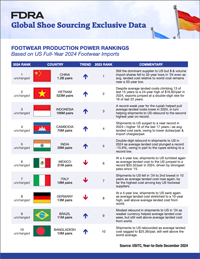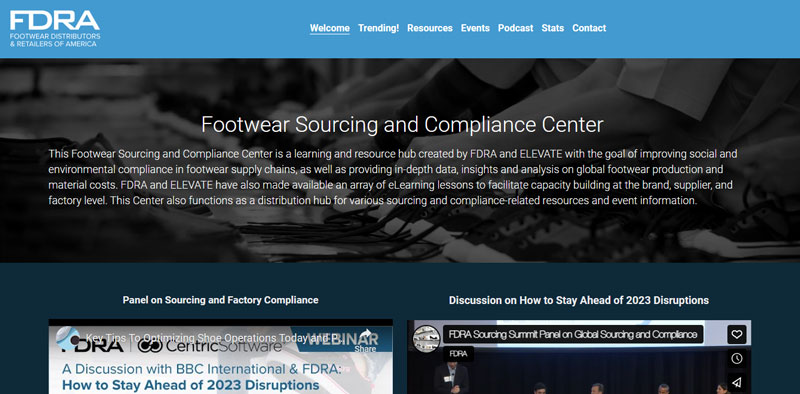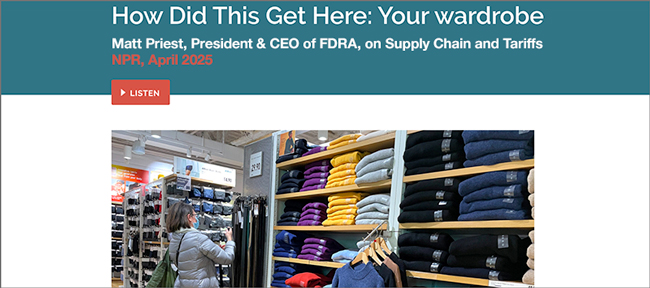Sourcing & Compliance
99% of all shoes sold in the U.S. are imported, with 2.147 billion pairs of shoes imported in 2023. That amounts to an average 6.3 pairs of imports per person across the country. In volume terms, China accounts for 57.7% of all imports followed by Vietnam at 24.3% and Indonesia at 7.7%. The remaining 10.2% is split among many different nations. About 25 million pairs of shoes are produced annually in the U.S.
Footwear sourcing has become increasingly complex, as footwear manufacturing is shifting around the globe. Social compliance and factory performance issues also continue to be a priority for the footwear industry. As a result, FDRA has developed robust sourcing and compliance programs aimed at helping footwear sourcing and compliance executives and managers understand shifts and trends, and how best to address challenges.
Below you will find information on FDRA’s sourcing and compliance initiatives and programs, including FDRA’s factory program, its Footwear Production Code of Conduct, sourcing resources, and insights via FDRA’s Shoe-in Show podcast. If you have questions about footwear sourcing and/or social compliance, or need assistance, please contact us.
Footwear Production Portal
Footwear sourcing and compliance professionals seeking in-depth data, training, trends and insights can visit our dedicated portal here. This website houses our online compliance training, our monthly data reports, as well as interviews and podcast episodes to keep you up-to-date.
For FDRA, enhanced factory conditions are a priority
The vision of FDRA and its members is to have safe and dignified working conditions for all workers throughout the global footwear supply chain. Its mission is to drive positive change in footwear factories worldwide through the development and execution of shared standards driving continuous improvement in working conditions, health and safety, and environmental stewardship.
Shoe Supplier Tiers Defined
- TIER 1 SUPPLIERS: take processed materials and components and a final shoe, package and send them to the footwear brand/retailer.
-
TIER 2 SUPPLIERS: develop refined raw materials into processed components going into Tier 1 final assembly: like the rubber soles, molded foams, fabric uppers, or insoles that are used to create the finished shoe.
-
TIER 3 SUPPLIERS: prepare / refine raw materials for Tier 2: like slaughterhouses/tanneries, chemical processing plants into synthetics/plastics, textile mills/yarn spinners/cotton gins, rubber vulcanizer, pelletized EVA, etc.
-
TIER 4 SUPPLIERS: farms, mines, and/or labs that provide raw materials. Examples: farming cotton, farms extracting rubber from trees, cattle farm, metal / mineral mines, or oil extraction company.
Sourcing and Compliance Resources
- Access compliance training, codes of conduct, current reports and data on footwear imports and material costs
- Members can find FDRA’s Sourcing & Supply Chain Update newsletter and archives here. If you are not a member, you can contact FDRA and purchase the sourcing assessment.
Sourcing and Social Compliance Intelligence
- FDRA updates members with alerts on trends, new issues or challenges, and provides in-depth documents and memos explaining and analyzing trade, sourcing, and social compliance issues. Members receive our monthly Sourcing and Supply Chain Update featuring import data, commodities analysis, and interviews with the industry’s leading service providers and sourcing executives. FDRA produces a robust annual factory survey and sourcing report for members that goes in-depth by country, exploring emerging trends and forecasts, as well as key trade and politics alerts vital to understanding free trade agreements and issues surrounding taxes and tariffs on shoes.
- Contact FDRA to learn how we can support your sourcing and compliance teams.
Sourcing and Trade Events
- FDRA hosts a Shoe Sourcing Strategy Summit in New York each year that goes in-depth on compliance, sourcing challenges and solutions, and features industry executives and experts presenting and discussing best practices.
- Our twice-yearly Footwear Tariff & Customs Digital Conference covers key customs issues such as tariff policy, footwear classification, the Uyghur Forced Labor Prevention Act (UFLPA), updates from U.S. Customs & Border Protection (CBP), live sample review, and other key customs issues. Learn more.






